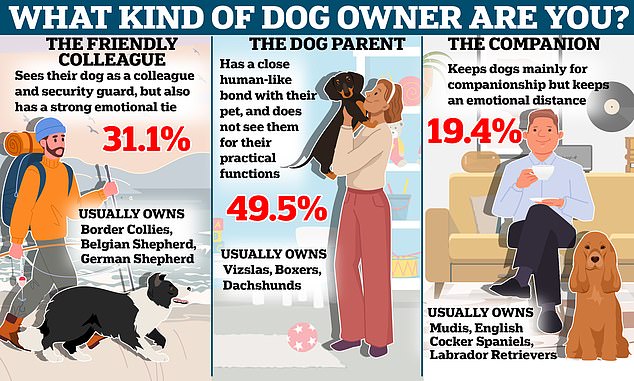What kind of dog owner are YOU? Scientists say all dog parents fit into three different categories

Dogs are often called “man’s best friend,” but a new study suggests some owners may need to reconsider this nickname for their pet.
Researchers from Hungary surveyed 800 dog owners and found that they all fit into three different categories.
“Interestingly, even though we collected data from online groups dealing with family dogs, the owners were not all the same,” explains Laura Gillet, lead author of the study from Eötvös Loránd University.
‘We found three different profiles of owners whose dogs played different social and practical roles.’
Dog owners who are considered “friendly colleagues” often see their pet as a colleague and guardian, but also have a strong emotional bond.
‘Dog parents’, on the other hand, have a close human-like bond with their pets and do not see them for their practical functions.
Meanwhile, ‘companions’ keep dogs mainly as companions, but keep an emotional distance.
So, what kind of dog owner are you?

Researchers from Eötvös Loránd University in Hungary surveyed 800 dog owners and found that they all fit into three different categories

‘Dog parents’ have a close human-like bond with their pets and do not see them for their practical functions (stock image)
In Western cultures, many owners view their dogs as best friends, family members, or even “furry children.”
However, until now, little research has been done on this social trend and how it affects the animals’ daily lives.
In their new research, the team wanted to understand exactly what role dogs play in today’s world.
About 800 owners were asked about their relationships with their pets, including what they like about them and the role they play in their lives.
The results showed that almost all owners surveyed really enjoyed the physical contact with their dog (97.6 percent), the ‘unconditional love’ their dog gives them (93.7 percent) and the look and beauty of their dog ( 88.4 percent). .
However, other benefits were less unanimous.
For example, about a quarter (24.3 percent) of owners did not benefit from the social interactions their dog provided, while 36.3 percent really liked them.
Based on the findings, the researchers say that all dog owners fit into three different categories.

Dog owners who are considered “friendly colleagues” often view their pet as a colleague and guardian, but also have a strong emotional bond (stock image)

‘Companions’ keep dogs mainly for company – but keep an emotional distance (stock image)
For 31.1 percent of owners, dogs have a dual function: both practical and emotional.
Known as “friendly co-workers,” these owners usually have Border Collies, Belgian Shepherd Dogs, or German Shepherd Dogs.
Next, the majority of owners (49.5 percent) have a close, human-like bond with their pets, and don’t see them for their practical functions.
Known as “dog parents,” these owners usually have breeds such as Vizslas, Bocers, or Dachshunds.
Finally, 19.4 percent of owners keep their dog mainly for company, but maintain an emotional distance.
Known as “companions,” these owners usually own mudis, English cocker spaniels, or Labrador retrievers.
“As we previously assumed, there were several canine and human factors associated with these three profiles,” says Professor Eniko Kubiny, head of the Ethology Department.
‘For example, dual-purpose dogs were perceived as very obedient and were trained with positive reinforcement and professional training methods such as clicker training.’
The researchers hope the findings will inspire further research into the complex relationship between people and their dogs.
‘Despite the general trend observed in Western countries where dogs are increasingly seen as family members who provide unconditional love and support, this study highlights that not all dog owners are the same, even in a sample interested in behavioral studies of dogs. ‘ the researchers wrote in their study, published in Scientific Reports.
‘Our results show that dogs can fulfill multiple (social and non-social) roles simultaneously in the lives of their owners, highlighting the complexity of the dog-human relationship.’




